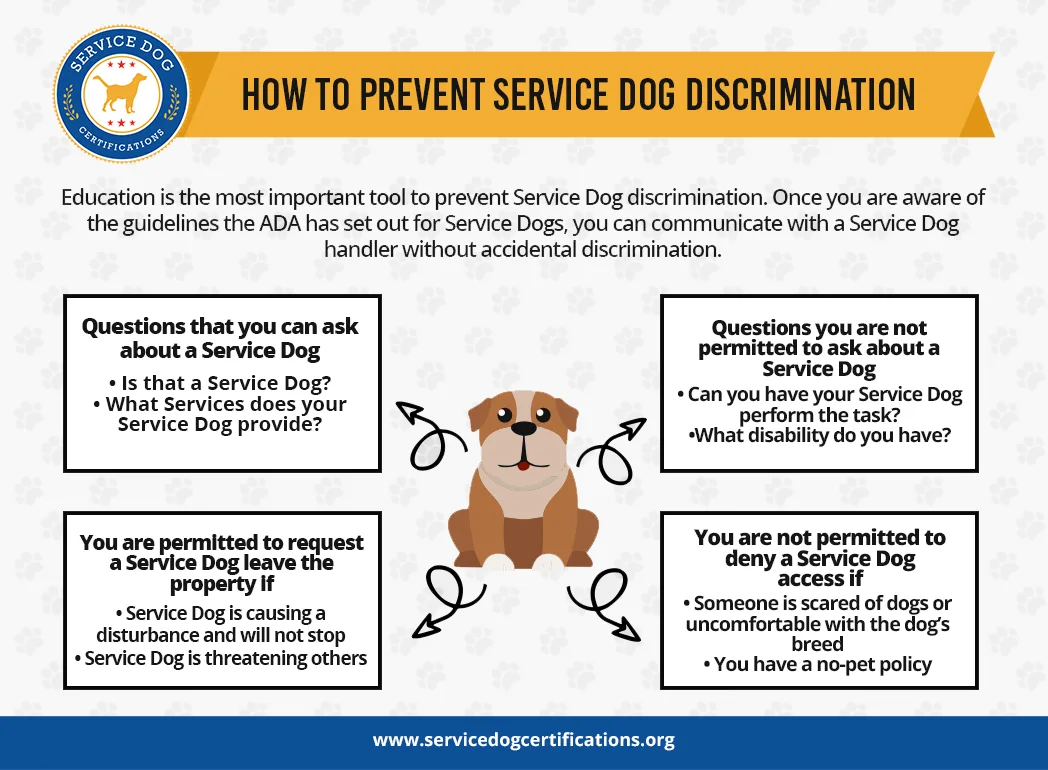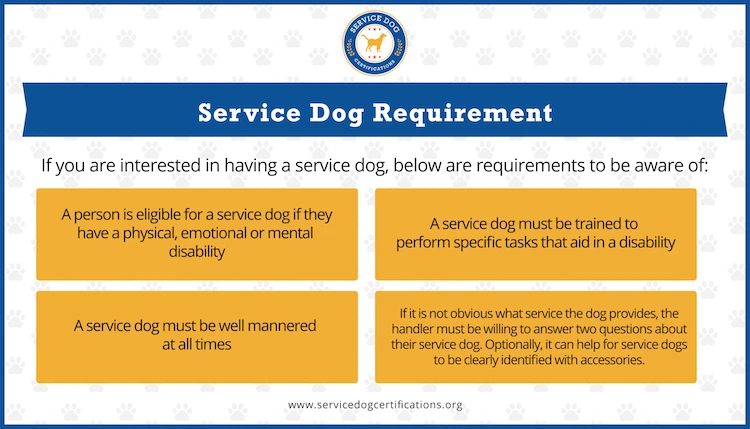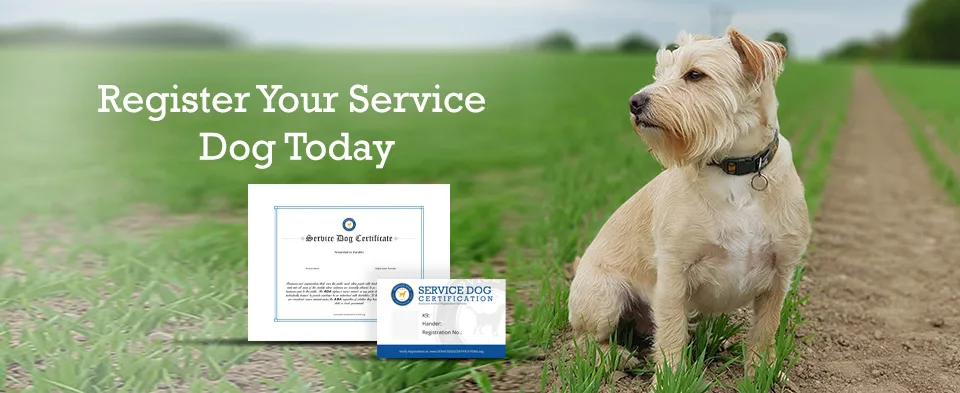Home Page › Blog › Can You Take a Service Dog to School
Can You Take a Service Dog to School

Every child dreams of taking their pet to school. Having their furry friend by their side could probably make any school day so much more enjoyable. For people with service dogs, however, bringing their canines to school makes their school day possible. To know exactly to what extent and under what laws you can take a service dog to school, read on below.
Service Dogs under the ADA
Service dogs receive extensive training to perform tasks. The tasks they learn help people manage their disability or disorder and help with their overall safety and well-being. Because service dogs do vital jobs, the U.S. Department of Justice’s Americans with Disabilities Act (ADA) allows the use of service dogs in areas where the public is typically allowed. These public areas include all agencies that serve the public—businesses, government facilities, non-profits, and schools.
Show everyone that the rights of your service dog should be respected. Get your service dog registered below.
Schools, Disabilities and Service Dogs
In most cases, children can’t take their pet dogs to school. A service dog, on the other hand, isn’t a pet. The service dog is an extension of a child’s treatment or management of their qualifying disability.
Disabilities can occur at any age. Therefore, a school-aged child may need the help of a service dog. As school takes up such a large portion of a child’s waking hours, a service dog may need to accompany them to school to make their school day even possible. The federal government protects individuals with disabilities and their right to have a service dog. People with disabilities can take their service dogs to school due to protection under three laws:
1. Section 504 of the Rehabilitation Act
Section 504 bans the discrimination of people with a disability in areas that accept federal funds. Public schools typically receive monies from the federal government to operate.
2. Americans with Disabilities Act (ADA)
The ADA ensures protections for people with disabilities. Title II of the ADA prohibits discrimination by state and local governments and their services, including public schools.
3. The Individuals with Disabilities Education Act (IDEA)
Applicable only to public primary and secondary schools (not public colleges and universities), the Individuals with Disabilities Education Act (IDEA) requires schools to create an Individualized Education Program (IEP) for every applicable student with a disability.
Under the IDEA, children with disabilities must have free and fitting public education, meeting the parameters of their disabilities. This requirement is considered a Free Appropriate Public Education (FAPE).
Service Dogs in Elementary and High Schools
A Free Appropriate Public Education (FAPE) provides supportive services that enable children with disabilities to benefit from the education offered. For example, if a service dog fits the FAPE as a supportive service, then a service dog can attend school along with a child. To determine whether a service dog is necessary to meet FAPE requirements, a child’s education team considers the following:
- Does the presence of the service dog affect a student’s ability to function independently?
- Can the tasks performed by the service dog be achieved through other practical means?
- Would a separation from the service dog affect a student’s skills to be independent during the school day?
- Does the service dog negatively or positively impact how a child develops and maintains social relationships?

Can Schools Refuse a Service Dog?
Despite the legal protections for service dogs, a few situations exist where a service dog can be refused.
- The school may decline a service dog if a child isn’t able to control the dog. A service dog must always be under the handler’s control. The child must know how to give orders to the dog and maintain control of the dog at all times.
- The school is under no obligation to care for the service dog. The child must look after the dog and attend to its needs. If the child cannot look after the service dog, the school cannot be burdened and may refuse entry.
- A service dog that is disruptive, aggressive, or is not housebroken can be asked to leave the premises.
If other children or staff in the school fear dogs or an allergy, the school may provide the service dog and child an area away from the others. However, a fear of dogs or a dog allergy isn’t sufficient cause to deny a service dog’s presence.
Service Dogs in College
The ADA applies to both public and private universities. For college dorms and other housing, HUD’s Fair Housing Act (FHA) allows dogs to remain in housing with their handlers—even when regulations say “no pets” are allowed. Colleges and universities must make reasonable accommodations for students and staff who have service dogs. Areas where students can take their service dogs include cafeterias, classrooms, and lecture settings— all areas where other students are typically allowed.
Conclusion
In short, schools must accommodate service dogs that have been fully trained to perform a work or task relating to a disability. Registrations, certifications, ID cards, and other accessories are completely optional once a service dog has been fully trained. These items, however, can be helpful in schools, so other students are aware the dog is a working animal.
Having service dog paraphernalia like ID cards and vests also allows instructors and school administrators to easily recognize that the student requires their dog because of a disability. Younger children, in particular, can be highly sensitive about constant inquiries about their disability or need for a service dog.
If you are considering bringing a service dog to your school, you may want to speak with your school’s administration to see what other rules and guidelines they have in place.
About the Author: The writing team at Service Dog Certifications is made up of folks who really know their stuff when it comes to disability laws and assistance animals. Many of our writers and editors have service dogs themselves and share insights from their own experiences. All of us have a passion for disability rights and animals.
Latest Posts

How to Bring a Service Dog to Disneyland
Trained service dogs are more than welcome to join their handlers at Disneyland. In this guide, we’ll explain Disneyland’s policies and give practical advice for bringing a service dog to Disneyland for the first time. Disneyland’s Service Dog Policies The Magic Kingdom is happy to welcome trained service dogs across most park locations! They kindly […]

Read More

Can Dogs Eat Tomatoes?
Yes! Dogs can safely enjoy tomatoes, but there are a few risks to be aware of so you can feed your dog responsibly. Fully ripe tomatoes (without the stems and leaves) can actually have nutrients that are good for your pup. Tomatoes have chlorogenic acid, an antioxidant that can have anti-inflammatory effects in cells. They’re […]

Read More

Can a Primary Care Doctor Write an ESA Letter?
Your family doctor, also called a primary care physician (PCP), can write a letter recommending an emotional support animal. We’ll explain what legally gives them that ability and explore what better options might be available for you. Why are Physicians Able to Write an ESA Letter? To turn your pet into an emotional support animal, […]

Read More








